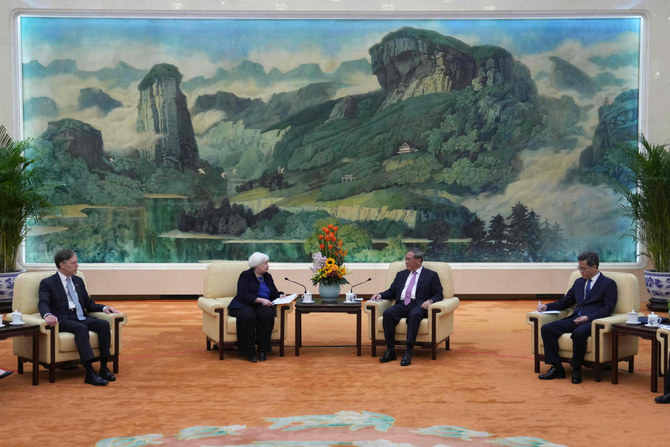BEIJING: US Treasury Secretary Janet Yellen and Chinese Premier Li Qiang sounded a hopeful note on bilateral relations at the start of their Sunday meeting in Beijing.
The US-China relationship can only move forward with direct and open communication, Yellen told Li, after arriving in the Chinese capital from the southern city of Guangzhou.
Li, in welcoming Yellen, said “China sincerely hopes that the two countries will be partners, not adversaries.”
He added that Chinese Internet users have closely followed the details of her trip since her appearance in Guangzhou, showing “expectation and hope for the China-US relationship to continue to improve.”
In Guangzhou, Yellen had a series of meetings including hours of discussions with her counterpart, Vice Premier He Lifeng.
Both countries have since agreed to hold talks on balanced growth under an existing working group, allowing officials to discuss the key US concern of “overcapacity.”
This refers to a situation where Chinese government support to industries fuels production capacity but risks a surge of exports at depressed prices to the global market, undercutting international competitors.
Washington is especially concerned about this phenomenon in new industries such as electric vehicles and solar energy.
Yellen’s trip marks her second visit to China in less than a year.
“While we have more to do, I believe that, over the past year, we have put our bilateral relationship on more stable footing,” she said in opening remarks to Premier Li as she begins two days of high-level talks in Beijing.
Rather than ignoring differences, this has meant “understanding that we can only make progress if we directly and openly communicate with one another,” the Treasury chief said.
Yellen added that both countries — the world’s two biggest economies — have a duty to “responsibly manage our complex relationship” and show leadership when it comes to working on global challenges.
On Saturday, the Treasury also announced that United States and Chinese officials would start talks under another existing working group for cooperation on tackling money laundering.
The aim is to cut off financing for actors such as drug traffickers.
Washington has been seeking to work with Beijing to curb supply lines for the production of fentanyl, the synthetic painkiller behind a US overdose epidemic.
Despite the outcomes of meetings so far, China’s state-run Xinhua news agency warned in a commentary of the “spectre of protectionism” in the United States.
It criticized existing US tariffs on Chinese imports, while accusing Washington of “suppressing” China’s electric vehicle-related industries, signalling at tensions that remain.
Another state media outlet, the Global Times, pointed to “negative actions toward China” in an editorial, referring to US trade and tech curbs, and “an ever-growing list of sanctions against Chinese companies.”
“Yellen’s visit has opened space to test the possibility for progress,” Brookings Institution senior fellow Ryan Hass told AFP.
He added that her trip has “illuminated that the Chinese recognize a need to engage on overcapacity and are prepared to explore cooperation on anti-money laundering.”
But only time can tell if these efforts bring material progress, he said.
In meetings with Vice Premier He, Yellen also warned companies in China not to provide support for Russia’s war in Ukraine — including to Moscow’s defense industrial base — cautioning of “significant consequences.”
While in Beijing, Yellen will also meet with the city’s mayor Yin Yong and Chinese Finance Minister Lan Fo’an on Sunday.
On Monday, she is due to speak with former vice premier Liu He and central bank governor Pan Gongsheng.
















